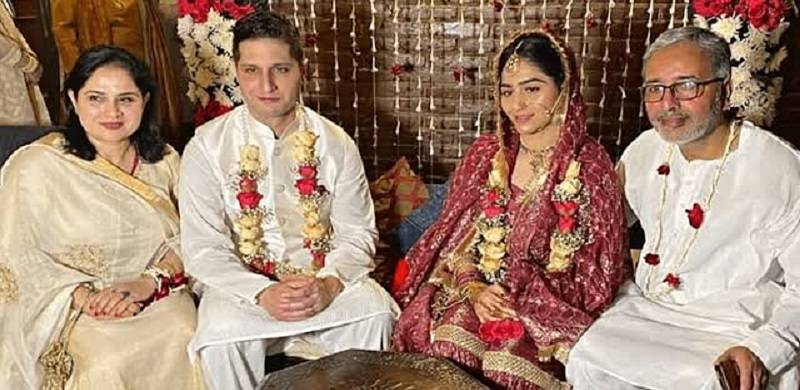
Breaking with tradition, a female qazi solemnized the nikah for the great grandson of former Indian president Dr Zakir Hussain and the daughter of senior Indian journalist Qurban Ali.
Dr Syeda Saiyadain Hameed, a former member of the county's planning commission, performed the ceremony between Gibran Rehan Rahman and Ursila Ali.
“The terms set forth in the nikahnama were prepared under the auspices of Muslim Women’s Forum - an organisation of which the groom’s great-grandmother, Begum Saeeda Khurshid, was a founding president.” Dr. Hameed shared, adding "I almost have tears in my eyes [...] this is a very moving moment."
Following with the family's involvement with the women's group, the bride came up with the idea to have the marriage solemnized by a female qazi, which the groom had the agreed to.
“There was no concept of a female qazi in the Indian Islamic society so we want to make a new beginning and when we talk about equality then why not a female qazi," the father of the bride said.
A video of the female qazi performing the ceremony went viral on social media.
https://twitter.com/ians_india/status/1502548948166516737
https://twitter.com/confidantaa/status/1502533873787363330?ref_src=twsrc%5Etfw
While the wedding between two heirs of the country's political elite may be breaking moulds, Muslims in southern India face increasingly restrictive measures, most recently, a ban on hijab in classrooms in Karnataka.
On Tuesday, the High Court of Karnataka, India upheld the ban on hijab in classrooms across the southern Indian state, ruling that the hijab is not an ‘essential religious practice’ in Islam. The verdict set a possible precedent for restricting religious garb for minorities across the country.
Dr Syeda Saiyadain Hameed, a former member of the county's planning commission, performed the ceremony between Gibran Rehan Rahman and Ursila Ali.
“The terms set forth in the nikahnama were prepared under the auspices of Muslim Women’s Forum - an organisation of which the groom’s great-grandmother, Begum Saeeda Khurshid, was a founding president.” Dr. Hameed shared, adding "I almost have tears in my eyes [...] this is a very moving moment."
Following with the family's involvement with the women's group, the bride came up with the idea to have the marriage solemnized by a female qazi, which the groom had the agreed to.
“There was no concept of a female qazi in the Indian Islamic society so we want to make a new beginning and when we talk about equality then why not a female qazi," the father of the bride said.
A video of the female qazi performing the ceremony went viral on social media.
https://twitter.com/ians_india/status/1502548948166516737
https://twitter.com/confidantaa/status/1502533873787363330?ref_src=twsrc%5Etfw
While the wedding between two heirs of the country's political elite may be breaking moulds, Muslims in southern India face increasingly restrictive measures, most recently, a ban on hijab in classrooms in Karnataka.
On Tuesday, the High Court of Karnataka, India upheld the ban on hijab in classrooms across the southern Indian state, ruling that the hijab is not an ‘essential religious practice’ in Islam. The verdict set a possible precedent for restricting religious garb for minorities across the country.

